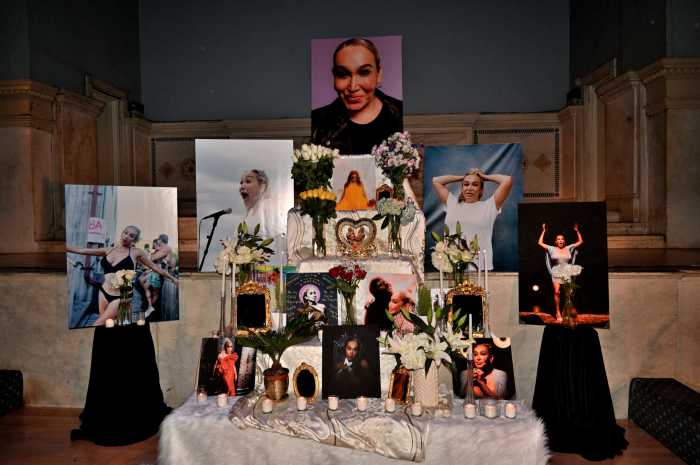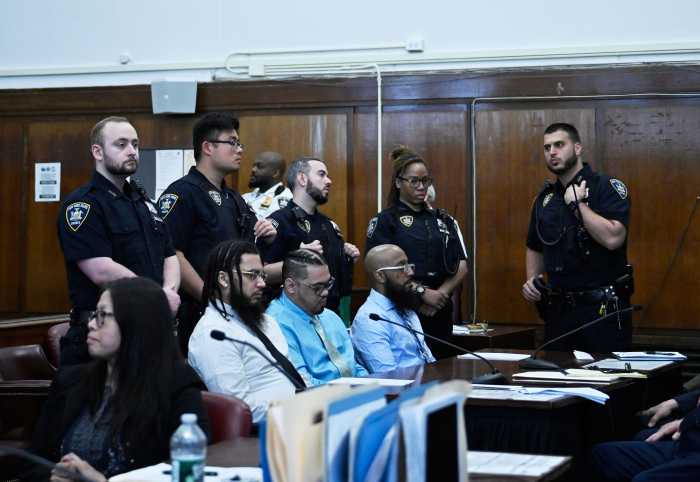Manhattan DA presses for second-degree murder conviction in ‘09 strangling of Edgard Mercado
Saying her client never intended to kill Edgard Mercado when he strangled him to death in 2009, a defense attorney for Davawn Robinson asked a Manhattan jury to convict the 24-year-old of criminally negligent homicide.
“I’m asking you to hold Davawn Robinson responsible, but hold him responsible for what he did,” said Annie Costanzo, one of Robinson’s two Legal Aid Society lawyers, during December 13 closing arguments. “He didn’t intend to kill Edgard Mercado.”
Robinson, taking the stand in his own defense the day before, told jurors that the strangulation death was an accident during sex. In Robinson’s recounting, the two gay men met at a West Village gay bar and traveled to Mercado’s East Village apartment, where they used cocaine and drank some wine. Robinson said that Mercado, 39, asked that Robinson use erotic asphyxiation in their sexual encounter.
“The combination of cocaine snorted, alcohol consumed… impaired both of their abilities for the risks involved,” Costanzo said.
The prosecution charges that Robinson intended to kill Mercado and is guilty of second-degree murder.
The trial judge, Daniel P. FitzGerald, will let the jury weigh murder, which has a maximum sentence of 25 years-to-life, second-degree manslaughter, which has a maximum penalty of 15 years in prison, and criminally negligent homicide, which carries a maximum of four years in prison. A defendant convicted of either of the two lesser charges could be eligible for release after serving six-sevenths of the sentence.
After killing Mercado, Robinson made a 22-minute 911 call and later gave a series of statements to police and prosecutors, in all of which he claimed he acted in self-defense. Those statements were inconsistent in some facts and overall improbable. The defense abandoned that argument during the trial.
Costanzo called her client’s earlier self-defense claim “a ridiculous story,” an “idiotic story,” and a “crumbling tale of lies” in her summation.
“What Robinson couldn’t admit to [Detective Jeffrey] Forde was that this case was about sex,” Costanzo said. “Davawn Robinson felt guilty, but he was struggling with telling the police what really happened.”
Costanzo also hammered on the lack of intent to kill, an element of the crime that is legally required to prove second-degree murder. A murderer has “a mind that wants, intends, and pursues death,” she said.
“They are the darkest and ugliest thoughts a person can have,” she said. “Davawn Robinson is not a murderer.”
Leila Kermani, one of two assistant district attorneys prosecuting the case, displayed a photo of a smiling Mercado at the start of her summation.
“There is no doubt that it was the evilest of minds and the darkest of minds that took the life of young Edgard Mercado,” she said.
The prosecution is relying on the testimony of a forensic pathologist from the city medical examiner’s office to prove that Robinson intended to kill Mercado.
As friends and Mercado’s sister wept or covered their eyes, Kermani displayed the victim’s autopsy photos that showed large bruises around his neck, above one eye, and on his chin, as well as scrapes on his cheek.
“These injuries together will tell you that this was an intentional act,” she said.
They showed there had been a struggle and two episodes of choking, with Mercado apparently successful in halting the initial round of choking, Kermani said. The first episode came while Mercado was still standing and Robinson wrapped the rope around his neck from behind, according to the prosecutor. In the second, Robinson had Mercado on the floor and was pressing him against a rough carpet and a piece of furniture, she said.
“This shows you that there was struggling… and, for a moment, Mr. Mercado won that struggle,” Kermani said.
To dramatize the final moments of Mercado’s life, Kermani wrapped a rope that resembled the one used to strangle Mercado around her own neck and let two minutes pass while she demonstrated how the rope was pulled.
“That was two long, uncomfortable minutes here in the courtroom, never mind two minutes in Mr. Mercado’s life,” she said.
Kermani said Robinson’s description of Mercado’s death was “a medical impossibility” that was unsupported by the forensic evidence and that there was no evidence that the two men agreed to strangling as part of sex.
“The defendant is the victim in this case and the victim is the deviant,” she said. “That’s what he is trying to sell you in this case.”
The rope used to strangle Mercado was part of a uniform he wore in a Brazilian dance class. Police found no sex toys, pornography, or bondage equipment in Mercado’s apartment.
































